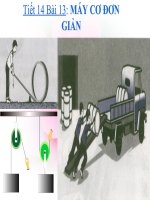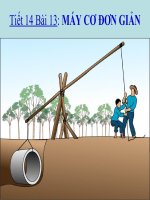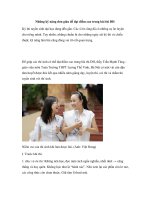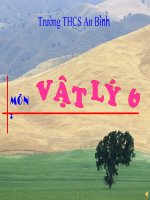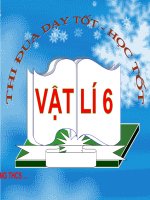Bài giảng Power Point thì present simple
Bạn đang xem bản rút gọn của tài liệu. Xem và tải ngay bản đầy đủ của tài liệu tại đây (1.35 MB, 30 trang )
The simple present tense is:
pronoun or noun + verb without to
They like / I work / you read etc.
I read a lot.
PRONOUN
VERB
The simple present tense is:
pronoun or noun + verb without to
They like / I work / you read etc.
I speak a lot.
PRONOUN
VERB
The simple present tense is:
pronoun or noun + verb without to
They like / I work / you read etc.
I work in a bank.
P
R
O
N
O
U
N
VERB
The simple present tense is:
pronoun or noun + verb without to
They like / I work / you read etc.
I like people.
PRONOUN
VERB
The simple present tense is:
pronoun or noun + verb without to
They like / I work / you read etc.
We study together.
P
R
O
N
O
U
N
VERB
The simple present tense is:
pronoun or noun + verb without to
They like / I work / you read etc.
I play the guitar.
P
R
O
N
O
U
N
VERB
We add “s” end of the verbs in third person singular.
“I / you / we / they read” but “He / she / it reads”
He works in a bank.
“I / you / we / they have” but “He / she / it has”
John has a shower every day.
They work in a bank. but
I have a shower every day.
but
Most verbs:
add –s to infinitive
work works
sit sits
stay stays
Verbs ending in
consonant + y
drop y and add -ies
cry cries
hurry hurries
reply replies
Verbs ending in –s, -z, -ch,
-sh, o, or x
add –es to infinitive
miss misses
watch watches
push pushes
do does
go goes
Exception:
have has
I
I
don’t
don’t
like football.
like football.
We use “DON’T” here for I, YOU, WE, THEY.
We use “DOES’NT” here for HE, SHE, IT.
Do
Do
you like football?
you like football?
We use “DO” here for I, YOU, WE, THEY.
We use “DOES” here for HE, SHE, IT.
Forms:
Forms:
I work.
You work.
He works.
She works.
It works.
We work.
They work.
Do I work?
Do you work?
Does he work?
Does she work?
Does it work?
Do we work?
Do they work?
I don’t work.
You don’t work.
He doesn’t work.
She doesn’t work.
It doesn’t work.
We don’t work.
They don’t work.
Posi"ve
Posi"ve
Nega"ve
Nega"ve
Ques"on
Ques"on
don’t = do not
doesn’t = does not
Use:
We use the simple present when we talk about things that happen
regularly, repeatedly or all the time.
The earth goes around the sun.
We use the simple present when we talk about things that happen
regularly, repeatedly or all the time.
What do frogs eat?
Use:
We use the simple present when we talk about things that happen
regularly, repeatedly or all the time.
It rains a lot in winter.
It rains a lot in winter.
Use:
We use the simple present when we talk about things that happen
regularly, repeatedly or all the time.
I play basketball every weekend.
I play basketball every weekend.
We use the simple present when we talk about our present habits.
Use:
We use the simple present when we talk about things that happen
regularly, repeatedly or all the time.
I swim every weekend.
We use the simple present when we talk about our present habits.
Use:
We use the simple present when we talk about things that happen
regularly, repeatedly or all the time.
I cycle to school every day.
We use the simple present when we talk about our present habits.
Use:
We use the simple present when we talk about things that happen
regularly, repeatedly or all the time.
I always go to work early.
We use the simple present when we talk about our present habits.
We use
Personal Pronoun or noun + always / never / often /
sometimes / usually + present simple
Use:
I usually go to work on foot.
We use
Personal Pronoun or noun + always / never / often /
sometimes / usually + present simple
Use:
Study these examples:
Study these examples:
I work in a shop.
The earth goes round the sun.
Nurses look after patients in the hospitals.
What does this word mean?
Does he smoke?
What do you do?
Rice doesn’t grow in the cold climates.
I don’t like washing the car.
Bill doesn’t do his job very well.
One day, people say to the
Hodja:
“Your wife walks from house to
house, tell her she mustn't walk so
much,”.
“Alright”, say the Hodja. “If she
comes to our house, I'll tell her.”
Busy - Body
Nasreddin Hodja
Reading
Reading
I . . . . . like the dog.
Fill in the blanks with correct word.
not
does
doesn’t don’t
Exercises
Exercises
:
:
. . . . . work very hard.
She
they
he it
Fill in the blanks with correct word.
Exercises
Exercises
:
:
. . . . . he like to do his homework?
not
does
doesn’t don’t
Fill in the blanks with correct word.
Exercises
Exercises
:
:
